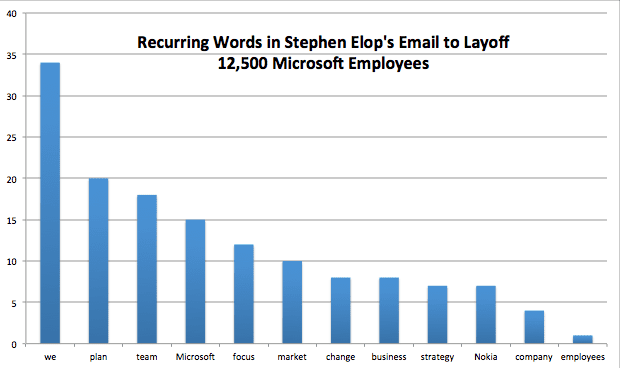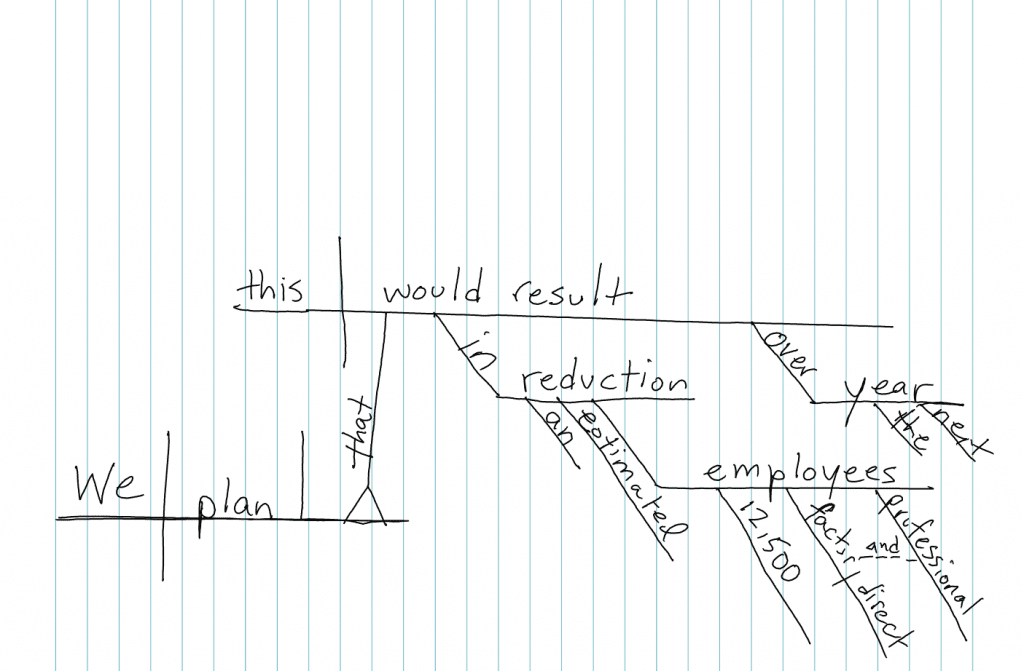Last week, when I was talking about balancing honesty and humility in business communication, Stephen Elop had already sent the worst layoff announcement in the history of Microsoft. His email was so bad, it invites us to imagine Elop fiddling while Microsoft burns.
In case you missed the story, the Executive Vice President sent a sprawling 13 paragraph, 1110 word email to announce the layoffs of 12,500 employees in his division.
The email began with a generic and absurd “Hello there,” before getting lost in its own MBA double speak. Rarely has there been a better example of text that refuses to show empathy to its recipients.
In fact, a quick, non-scientific analysis of the email’s diction shows that Stephen Elop is much more focused on explaining himself, his decision, and his team. As you can see from the chart below, Elop’s intended audience, the employees who are losing their jobs, only appear in the email one time.
Once.
In paragraph eleven.
Buried in a prepositional phrase at the end of a subordinate noun clause that is the predicate of a corporate plan.
Just to emphasize that point, let’s diagram the offending sentence, shall we?
I could keep going with this. I could turn Elop into a cautionary tale of rhetoric gone wrong. I could list out the five lessons to be learned from Elop’s folly. I could list 7 steps toward more empathetic communication. I could just give him the rhetorical and literal finger. But that would be missing the point. That would be throwing stones at Stephen Elop while pretending I’m without sin.
Of course, the email is a sin. That is, it misses the mark. It fails to communicate. It fails to explain. It almost fails to reveal the author’s sense of loss for the 12,500 people who will no longer have a job.
Christianity is a religion of words. The Book of John tells us, “In the beginning was the Word.” The Word is light and life and God himself. The Book of Genesis tells us, “God said, ‘Let there be light.’” God words become real. God’s creativity is explained to us as an act of language.
In fact, God takes a lot of heat for this in our culture. We like God when he shares about goodness and love and mercy and hope. But that is not all God has to say. He also condemns sin: lust, gluttony, greed, sloth, wrath, envy, pride. Sometimes this condemnation can get very personal. God doesn’t beat around the bush. He is the bush and the bush is burning.
Stephen Elop isn’t God. Unlike God, Elop doesn’t shoot straight in his email announcement. In the Bible God is often very specific about what people have done wrong and what downsizing God is going to bring upon them. God even seems kind of mean sometimes, like in Isaiah, when he calls Israel a whore.
That’s harsh, God.
And yet, God’s straightforward honesty and clarity are somehow kinder than Elop’s email. God is confident enough to be the bad guy. God doesn’t mind telling people that have completely screwed up, and he is seriously ticked off.
Elop doesn’t have that confidence. His tone is weak. He hides behind jargon. He avoids accountability with first person plural.
The Internet is quick to call him out for his sins, but the Internet isn’t God either. Many of the articles out there display exactly the lack of empathy that Elop does.
We don’t want to empathize with Elop. We want to vilify him because 12,500 people just lost their jobs. We need someone to blame.
But imagine yourself in his place for a minute. Try to forget about the 9.6 million dollars in compensation that he received last year. I know, it’s hard. But try.
Empathize with Elop. Assume his motivations are the same as yours. He wants everyone to like him. He wants to run a good company. He doesn’t want to tell people their jobs are disappearing. But that is the truth he has to tell.
In his email, he avoids the truth as long as he can. He puts it off for a full eleven paragraphs. Even when he finally spells it out, he buries the facts as deeply as he can in the sentence. He qualifies his statements. He shares the blame. He even tries to make the market into a big, bad villain.
This is not good communication.
But neither is it villainy.
When we rant and rail against Stephen Elop, we turn him into our personal scapegoat. We put on him all of our own sins, all of our own communication failures, and then we send him over a cliff.
Stephen Elop probably doesn’t deserve much mercy for the email he sent.
Let that be a reminder to all of us the next time we prepare to communicate a particularly hard truth.
[Featured image of Stephen Elop by Luca Sartoni, used via creative commons.]


















